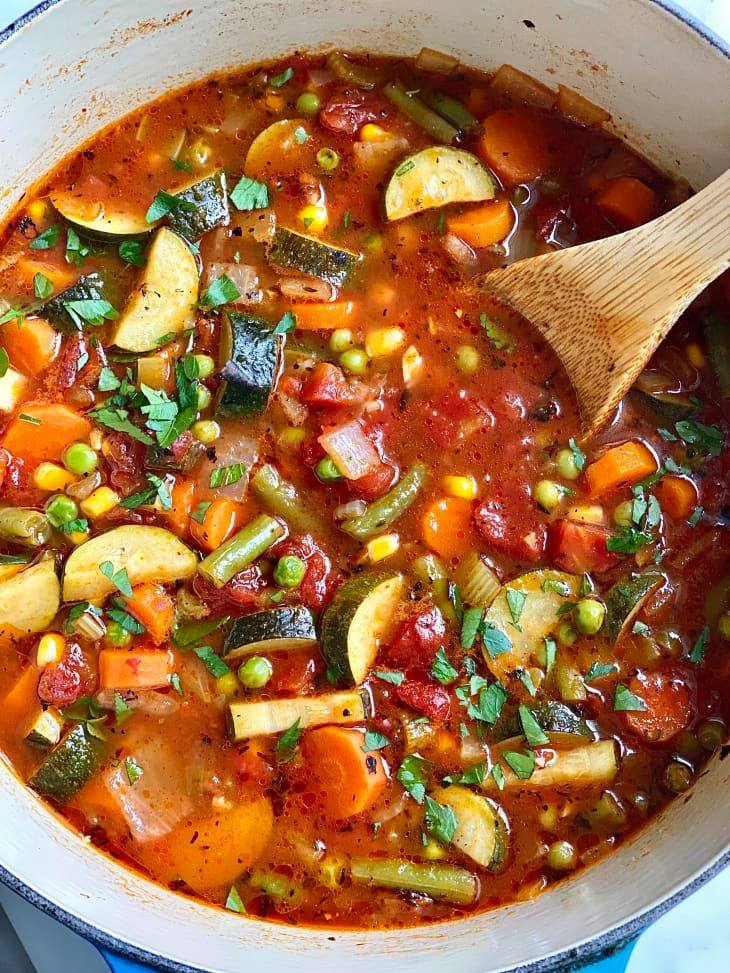Delving into the realm of vegan cuisine unveils a vibrant tapestry of flavors, colors, and textures, each dish weaving its own narrative of sustainability, health, and compassion. Amidst this culinary landscape, the Loaded Vegan Vegetable Soup stands as a testament to the versatility and richness of plant-based ingredients. With its symphony of vegetables, legumes, and herbs, this soup not only tantalizes the taste buds but also nourishes the body and soul.
Picture a bustling kitchen, where the aroma of sautéed onions dances in the air, mingling harmoniously with the earthy scent of freshly chopped vegetables. Here, the journey of creating Loaded Vegan Vegetable Soup begins—a journey that transcends mere cooking, evolving into a celebration of nature’s bounty. As carrots, celery, and bell peppers sizzle in the pot, their vibrant hues foreshadow the explosion of colors that will adorn the final dish.
In this culinary narrative, every ingredient plays a pivotal role, each adding its unique essence to the collective symphony of flavors. From the robustness of sweet potatoes to the subtle sweetness of corn kernels, each vegetable brings its own character to the mix, creating a medley that is as visually captivating as it is delicious. Furthermore, the addition of protein-rich legumes such as lentils or chickpeas not only enhances the soup’s nutritional profile but also adds a satisfying heartiness to every spoonful.
Yet, beyond its culinary prowess, the Loaded Vegan Vegetable Soup serves as a testament to the ethos of mindful eating and sustainability. In a world where food choices carry profound implications for the health of our planet, opting for plant-based dishes offers a path towards reducing our ecological footprint. By showcasing the abundance of flavors inherent in vegetables and legumes, this soup invites us to embrace a more sustainable approach to nourishment—one that honors the interconnectedness of all living beings.
Moreover, the act of preparing Loaded Vegan Vegetable Soup fosters a sense of connection—to the ingredients, to the environment, and to one another. Whether shared with loved ones around the dinner table or savored in solitary contemplation, each spoonful becomes a moment of communion with the natural world. In this way, the soup transcends its role as mere sustenance, becoming a catalyst for deeper connections and meaningful conversations.
As the pot simmers gently on the stove, the flavors melding together in perfect harmony, one cannot help but marvel at the transformative power of simple ingredients. In a world often characterized by complexity and chaos, the simplicity of a bowl of Loaded Vegan Vegetable Soup offers solace—a reminder of the beauty that can be found in the uncomplicated pleasures of life. So, let us savor each spoonful, not just for its culinary delights, but for the stories it tells and the connections it fosters.
Here is some Important tips:
Gut Health:
Plant-based diets are often associated with improved gut health due to the high fiber content from fruits, vegetables, and whole grains. A healthy gut microbiome is linked to better digestion and overall well-being.
Anti-Inflammatory Properties:
Many plant-based foods have anti-inflammatory properties, which can help in reducing inflammation in the body. Chronic inflammation is associated with various health issues, and a vegan diet may contribute to its prevention.
Sports Performance:
Contrary to the misconception that vegan diets lack protein, many successful athletes follow plant-based diets to enhance their performance. Plant-based proteins can support muscle building and recovery.
Reduced Risk of Foodborne Illnesses:
Plant-based diets eliminate the risk of foodborne illnesses associated with the consumption of undercooked or contaminated animal products.
Economic Impact:
A vegan diet can be more economical as plant-based protein sources tend to be cost-effective compared to some animal products. It may be a budget-friendly option for individuals or families.
Mindful Eating:
Adopting a vegan lifestyle often promotes mindful eating. Being more conscious of food choices and sources can lead to a healthier relationship with food and a greater appreciation for the environmental impact of dietary decisions.
Preservation of Biodiversity:
The expansion of animal agriculture often leads to habitat destruction and loss of biodiversity. Choosing a vegan diet supports the preservation of ecosystems and the protection of various species.
Culinary Diversity:
Veganism introduces individuals to a diverse range of cuisines and ingredients from around the world. Exploring plant-based cooking can be a culinary adventure, embracing flavors and techniques from different cultures.
Reduced Antibiotic Resistance:
The use of antibiotics in animal farming contributes to the rise of antibiotic-resistant bacteria. Opting for a vegan diet can be a way to reduce the demand for such practices and promote responsible antibiotic use.

